Chloe Clark Willson
(1818-1874)
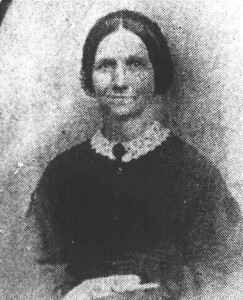
This photograph was displayed as a part of the Cemeteries exhibit from January through March, 1995 in the Heritage Room at the Salem Public Library. Chloe Aurelia Clarke Willson was born in 1818 and journeyed to Oregon from Connecticut on the Lausanne in 1840. She was assigned to the Nisqually station on Puget Sound where she met her husband Dr. William Holden Willson (1805-1956). They relocated to the site of the present day city of Salem where Dr. Willson platted and named the city and donated a park tract which still bears his name. The Willsons had three children. Chloe died at age 56 on June 2, 1874., Salem Public Library HRE66
“I feel the weight of responsibility which rests upon me in giving character to this infant institution,” wrote Chloe Clark Willson on August 13, 1844, the first day of classes at the Oregon Institute. Chloe was the first teacher at the school, founded by Methodist missionaries, which would grow under her guidance to become Willamette University. Chloe devoted her life to bringing religion and education to Oregon, and particularly to educating the young women of Salem.
Chloe Aurelia Clark was born on April 16, 1818, in Connecticut. She was educated at the Wilbraham Academy, the seminary that trained a number of the missionaries who came to Oregon, including Jason Lee. Many of Chloe’s friends were astounded that, with the advantages of her education and social position, she would want to leave the civilization of the east coast to become a missionary in the wilderness of Oregon, but that was exactly what she did. In 1839, twenty-one-year-old Chloe sailed out of New York on the ship Lausanne, as one of about fifty new recruits for the Jason Lee’s Willamette Mission, known later as the “Great Reinforcement.”
Chloe recorded her experiences and reflections in a diary, covering the 13,000 mile voyage on the Lausanne, her experiences as a missionary teacher, and the last period of her life. Her diary records not only her day-to-day experiences but also her deep religious faith, with constant prayers for God’s guidance and assistance. Historians today are fortunate to have Chloe’s diary, which was donated to Willamette University in 1935 by Joseph Gill, the husband of Chloe’s daughter Frances.
Soon after the Great Reinforcement arrived at the Willamette Mission in May 1840, Chloe was sent to a new mission station at Nisqually on Puget Sound, which had been established by Reverend David Leslie and Dr. William H. Willson the year before. Chloe was busy as she applied herself to the difficult job of learning enough of her students’ language to communicate, but she apparently had time for a brief courtship. She and William became acquainted and were married only a month later, on August 16, 1840. Her diary during this period reflects her introspection concerning her religious faith, her happiness with her “dear companion,” her health concerns after losing her first child, and her efforts as a teacher.
The next spring, Chloe and William were moved to another mission station at Willamette Falls (Oregon City). These were discouraging times: Chloe felt unable to change the way of life she found among native children, William’s health did not seem sturdy enough for the heavy carpentry work, and serious differences arose between the missionaries and laymen. During the three years William and Chloe remained in Oregon City, they remained active in missionary activities, but became increasingly involved in the life and growth of the settlement.
By late spring of 1844, Chloe and William had been asked to move to the settlement at Chemeketa Plains where Chloe had been chosen to open the Oregon Institute, a school for white children which would replace the failed Indian Manual Training School. When the Institute opened in August 1844, Chloe was both the teacher and housemother for the five primary grade students. She remained the only teacher for the school’s first two years, in which time it grew to twenty students. Mrs. Willson conducted classes on the first floor of the three-story Oregon Institute building; the girls’ dormitories were on the second floor, and boys on the third floor.
In 1846, the board of the Institute decided to lay out a town on the school’s land and sell lots in order to attract settlers to the area and raise funds for the school. Dr. Willson was chosen as business agent for the board and took charge of its landholdings, which included what is now downtown Salem, for “safekeeping.” He drew up the first plat of the town and possibly gave it the name Salem, although that it still debated.
After the Donation Land Claim Law of 1850 passed, conflicts arose between the Willsons and the Oregon Institute board over the title to the land. Under the 1850 law, the 640 acre property belonged jointly to both William and Chloe. Although Dr. Willson was bound to the trustees to administer the land for the University, Chloe was not, and insisted that her legal right to the land be recognized. The dispute was resolved in 1854, when the Willsons and the trustees reached a compromise. A line was drawn splitting the property in half along State Street; the 320 acres to the south would belong to the Institute, and the 320 to the north would belong to Chloe. Throughout the disagreement, Dr. Willson apparently remained a member of the board of trustees, and Chloe continued teaching at the Oregon Institute, and later at Willamette University.
In 1848, as Oregon was transformed into a U.S. Territory, Chloe wrote in her diary, “My heavenly father has increased my responsibilities by committing to my charge a lovely daughter,” who she named Frances. Two other daughters, Laurabelle and Kate Augusta Lee, were born in 1851 and 1855. Before the last daughter was born, William built an Elizabethan-style cottage on the northeast corner of Court and Capitol streets, not far from the new Territorial Capitol building, itself built on land donated by the Willsons out of Chloe’s 320 acres. Meanwhile, the board of the Oregon Institute chartered “Wallamet University” in 1853, offering higher education in addition to the primary schooling available at the Institute.
In 1856, William Willson died suddenly while working at the drugstore he ran in downtown Salem. Chloe was a widow after only 16 years of marriage. She returned to the east after his death in order to put her daughters in school, and for some years opened her home to students. Chloe returned to Salem in 1863, where she served as Governess of the Ladies Department at Willamette University, a position similar to dean of Women. She lived in a large house near the Willamette campus, where female students boarded with her. The 1864 W. U. Catalogue stated that, “Young ladies will find a home in the family of the Governess, Mrs. C. A. Willson, who has consented to open her large and pleasant residence for this purpose. Pupils under Mrs. Willson’s care will enjoy special advantages in Music and Painting, Board $4.00 per week.” In 1880, Chloe’s former home was moved two blocks to the Willamette campus and became the home of the Willamette Women’s College, later named Lausanne Hall.
During her second year as Governess, Chloe gave a lecture on the purpose of education for women, entitled “The Sphere of Woman.” Like many other influential Victorian women, she defined this sphere as, “Surely not the halls of Legislation, the Bar or the Pulpit–but in the sweet Paradise of home–The refined social circle. Do you inquire of her mission? It is to mold character… The training which you here receive is not to elevate you above your sphere, or to remove you from it, but to qualify you to move in it with ease, grace, and dignity,” she reminded her students.
These conservative sentiments, advocating traditional, domestic roles for women and the “sweet Paradise of home” seem somewhat strange coming from Chloe Willson, an independent woman who traveled 13,000 miles to an unknown wilderness at age 21, fought for her right to own land in her own name in 1850, and spent much of her life employed as a teacher–a woman who was once called “four feet of greatness” because of her strong character and short stature. there is one thing that we can be sure of, though; Chloe was wholly devoted to “her mission… to mold character.” In her years at the Willamette Mission, the Oregon Institute, and Willamette University, she not only molded the character of her students but of the Salem community.
Lucy Anna Lee Grubbs succeeded Chloe as head of the Women’s Department in 1866. In 1871 Chloe moved to the Portland home of her daughter and son-in-law, Frances and Joseph Gill, where she died three years later, on July 2, 1874, at age 56. Her body was returned to Salem where she was buried in the old Oddfellows cemetery (now Pioneer Cemetery) where a marble Obelisk marks the gravesite she shares with William. In 1935, Chloe’s daughter Frances published a novel based on her mother’s life, dramatizing her experiences as a missionary teacher.
Written by Virginia Green and Katherine Wallig
Bibliography:
“Bits for breakfast: The Chloe A. Willson Diary goes to Willamette.” Oregon Statesman. 29 May 1935, p. 4. Salem Public Library Hugh Morrow Pamphlet Collection.
“Chloe Aurelia Willson.” Salem Pioneer Cemetery website. March 3, 2004. <http://www.open.org/~pioneerc/pg48.html#WillChlo7317> June 8, 2004.
Jones, Alfred C. “Chloe Willson helped bring education to Salem mission.” Statesman Journal. [undated clipping] Salem Public Library Hugh Morrow Pamphlet Collection.
Gatke, Robert Moulton. Chronicles of Willamette, the Pioneer University of the West. Portland: Binford & Mort, 1943.
Gill, Frances. Chloe Dusts Her Mantle: A Pioneer Woman’s Idyl. New York: Press of the Pioneers, 1935.
Krebbs Smith, Helen, ed. With Her Own Wings: Historical Sketches, Reminiscences, and Anecdotes of Pioneer Women. Portland: Beattie and Co., 1948. pp. 76-8.
Westenhouse, Sybil. “The Willsons in Salem.” Marion County History. Volume XV, pp.13-49.
This article originally appeared on the original Salem Online History site and has not been updated since 2006.



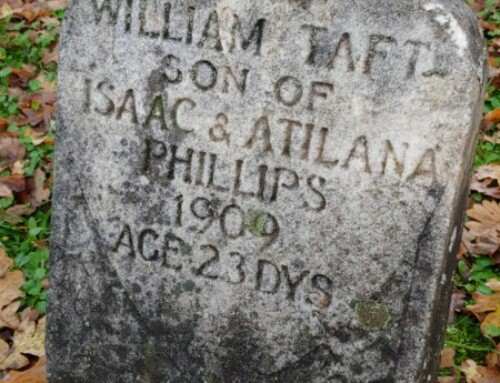
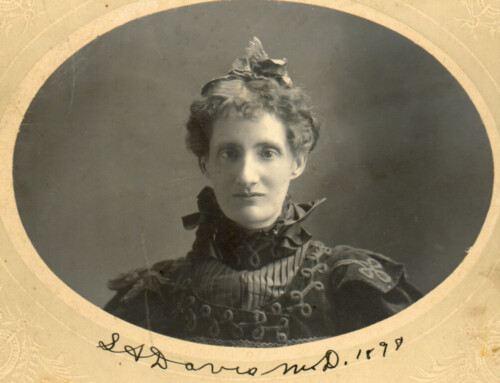
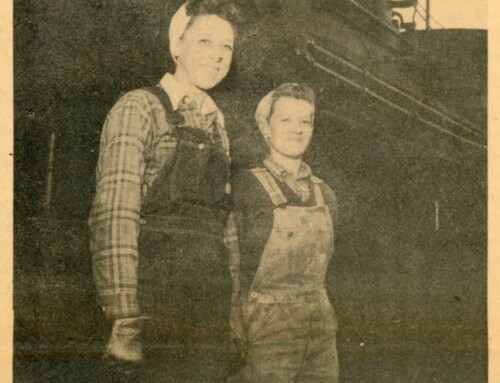
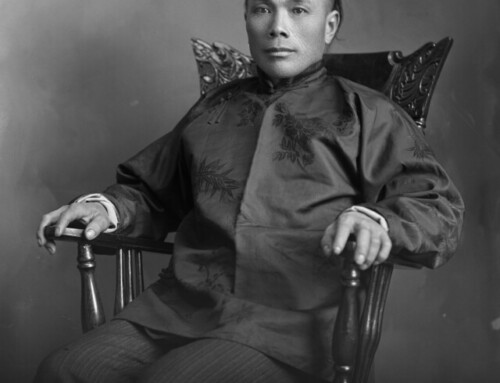
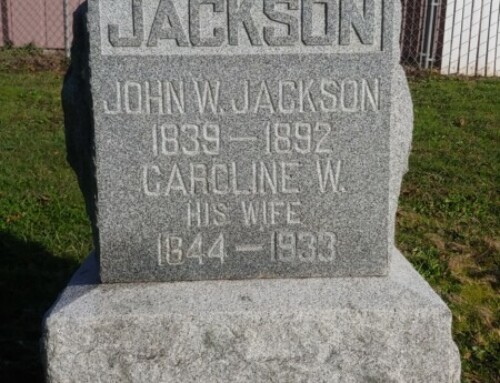
Leave A Comment